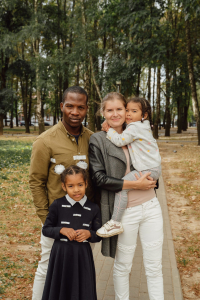A happy family is but an earlier heaven – Sir John Bowring
The quote from Sir John Bowring reminds us of the profound impact that one’s family can have on them. Our families are the place where we first discover what it means to be loved and accepted. That is where our identity, sense of delight and wonder and belonging first develop. When our family is a happy one, that truly is a small taste of the wholeness God desires for people.

The converse of that is that when our family is dysfunctional in one way or another, it can have many negative repercussions that reverberate throughout our lives. The good news is that family problems aren’t permanent fixtures. They can be addressed, and unhealthy patterns of behavior can be substituted for healthy ones with help from a Christian counselor.
Different types of family problems.
Families come in many different shapes and sizes, and no two families are the same. Each family has its own stories, traditions, quirks, and flaws that give it its unique shape. Family problems don’t manifest in the same way, nor do they affect family members in exactly the same way. That being said, the following are some of the common problems that families experience and that can create an unhealthy dynamic. Agoura Christian Counseling can help guide you through these challenges, offering support to restore balance and strengthen your family relationships.
Addiction issues, anger issues, or mental health challenges.
These issues can include depression, eating disorders, anxiety disorders, body dysmorphia, dementia or others. These challenges don’t just affect the person concerned; they affect the whole family and sometimes are contributed to by the family dynamics.
Issues with communication.
The family members may struggle with talking with each other and understanding one another’s concerns and interests. In some families, there may be very little to no communication whatsoever, and in others the family struggles with effective listening skills.
Lack of forgiveness.
People wound each other, whether inadvertently or intentionally. These slights can create rifts in a family, which may lead to resentment or factions forming in the family.

Lack of mutual support within the family unit.
This may range from lack of support over choices of lifestyle or career, to withdrawal of financial support. Sometimes, lack of support manifests as constant criticism.
Control issues, including codependency.
One or more family members may be too invested in the lives of the others, leading to controlling behaviors and not letting people make their choices and deal with the consequences
Abuse.
This includes emotional, physical, or sexual abuse in the family. These shatter the sense of safety that ought to exist within a family, and they unleash potential mental, physical, and emotional issues.
Sudden transitions.
Dealing with changed circumstances, such as the breadwinner losing their job and the family having to thoroughly downgrade their lifestyle.
Changing family dynamics.
through either a new baby being born, creating a new blended family through marriage, adopting a child, or a young child becoming an adolescent. These changes can spark off insecurities about the new normal and what one’s place is in the new situation.
Grief due to the loss of a loved one.
That loss can be through death, divorce, a broken relationship, moving away from loved ones, chronic severe illness or through a disease like schizophrenia or dementia in which the loss may be gradual.
Parenting issues.
Discipline issues with the children, or the parents being on radically different pages about how to raise their children.
These issues and many others may affect how family members interact with one another, and they can create unhealthy dynamics in relationships.
How to address family problems.
Challenges of various kinds will interrupt even the most idyllic family situation. These difficulties ae inevitable, as life will always give us lemons. However, what isn’t inevitable is that these challenges destabilize your family and leave your bond in tatters. Often, when issues come up, matters escalate for a variety of reasons including:
- People are too angry to listen to one another.
- The family doesn’t possess the skills to communicate felt needs effectively and constructively.
- Family members have different points of view and solutions, but are unable to negotiate successfully or respect the different viewpoints.
When these factors come together, a challenge can escalate and threaten the integrity and wellbeing of the family.
When an issue first presents itself, there are several things that the adults in the family can do to deescalate things and work toward a healthy resolution.
Figure out if the issue is worth confronting. Some issues are neither here nor there, and there’s no need to take a firm stand.
Resist the impulse to push your perspective and prove that you’re right or win the argument. Remember that you’re in this together, and a solution that works for everyone benefits the whole family. If you’re angry, take a moment to breathe so that you don’t speak in anger and say or do something you’ll regret.
When you speak, do your best to separate the person from the issue. Confusing the two may make it hard for you to show compassion.
Define and name the issue. That way, everyone knows what the issue is and (hopefully) sticks to the topic at hand. Even with complex issues, it’s better to try and deal with things one issue at a time.
Respect the other person’s perspective and demonstrate that by listening to them carefully. It takes great skill to listen without getting distracted and not jumping to conclusions or interrupting. Paying close attention to non-verbal cues, summarizing what’s been said, and asking clarifying questions will help the other person feel heard, and you’ll know what their concerns are.
The value of listening well is that it makes it easier to respond to the issues as they are, not as you perceive them. Parents can model effective listening to their children, and it’s a skill that will serve them in later life.

As you listen, try to find common points. Express yourself clearly and try by all means to stay calm and put your emotions to the side. This will help you in the attempt to see things from the other person’s perspective, and it also prevents your emotions from overwhelming or undermining the feelings of others particularly where there are different power dynamics in the relationship.
Propose and come up with as many possible solutions as you can. These solutions will likely contain some compromise, which means that you’ve both yielded ground to one another. It is important that when you agree to a particular solution, everyone should clearly understand the chosen solution and commit to work it through. Of course, situations change, and solutions may need to be revisited and updated if they aren’t as practicable as initially thought.
Christian Family Counseling
Family dynamics take time to develop, and they involve every member of the family. Changing those dynamics takes time and concerted effort. Ingrained habits don’t die easily, and they require sustained effort by the whole family for tangible change to be seen. Don’t give up though. A happy family life is beneficial for all, and it is worth fighting for.
Family problems can be complex, and sometimes strong emotions or power imbalances make it difficult to resolve the issue on your own. In such situations, or where you find that matters have escalated beyond your capacity to engage well with each other, such problems can only be addressed in a counseling situation.
Consider making use of Agoura Christian Counseling to address family problems. Counseling is a neutral space in which you can receive skilled guidance and the tools to develop healthy communication.
It is a powerful way in which you can make an effective commitment to changing things in your family.
Make the effort to get the most out of your counseling sessions. Even if some family members aren’t on board, those who are on board can do the work and begin changing things around. By God’s grace, the positive example and influence of others often does affect those around them. Reach out today and contact a Christian counselor who can walk with your family toward a healthier and happier home life.
“Happy Couple”, Courtesy of Polina Kuzovkova, Unsplash.com, Unsplash+ License; “Mother and Daughter”, Courtesy of Ben Iwara, Unsplash.com, CC0 License; “Happy Family”, Courtesy of Polina Kuzovkova, Unsplash.com, CC0 License; “Pink Flowers”, Courtesy of Aedrian, Unsplash.com, CC0 License
-
Shirley Kauffman: Author
As a Licensed Marriage and Family Therapist, I provide faith-based counseling for individuals, couples, and families facing a wide range of issues including anxiety, depression, marriage problems, divorce, and other family issues. With God’s help, I’...
-
Kate Motaung: Curator
Kate Motaung is the Senior Writer, Editor, and Content Manager for a multi-state company. She is the author of several books including Letters to Grief, 101 Prayers for Comfort in Difficult Times, and A Place to Land: A Story of Longing and Belonging...
DISCLAIMER: THIS ARTICLE DOES NOT PROVIDE MEDICAL ADVICE
Articles are intended for informational purposes only and do not constitute medical advice; the content is not intended to be a substitute for professional medical advice, diagnosis, or treatment. All opinions expressed by authors and quoted sources are their own and do not necessarily reflect the opinions of the editors, publishers or editorial boards of Stone Oak Christian Counseling. This website does not recommend or endorse any specific tests, physicians, products, procedures, opinions, or other information that may be mentioned on the Site. Reliance on any information provided by this website is solely at your own risk.







